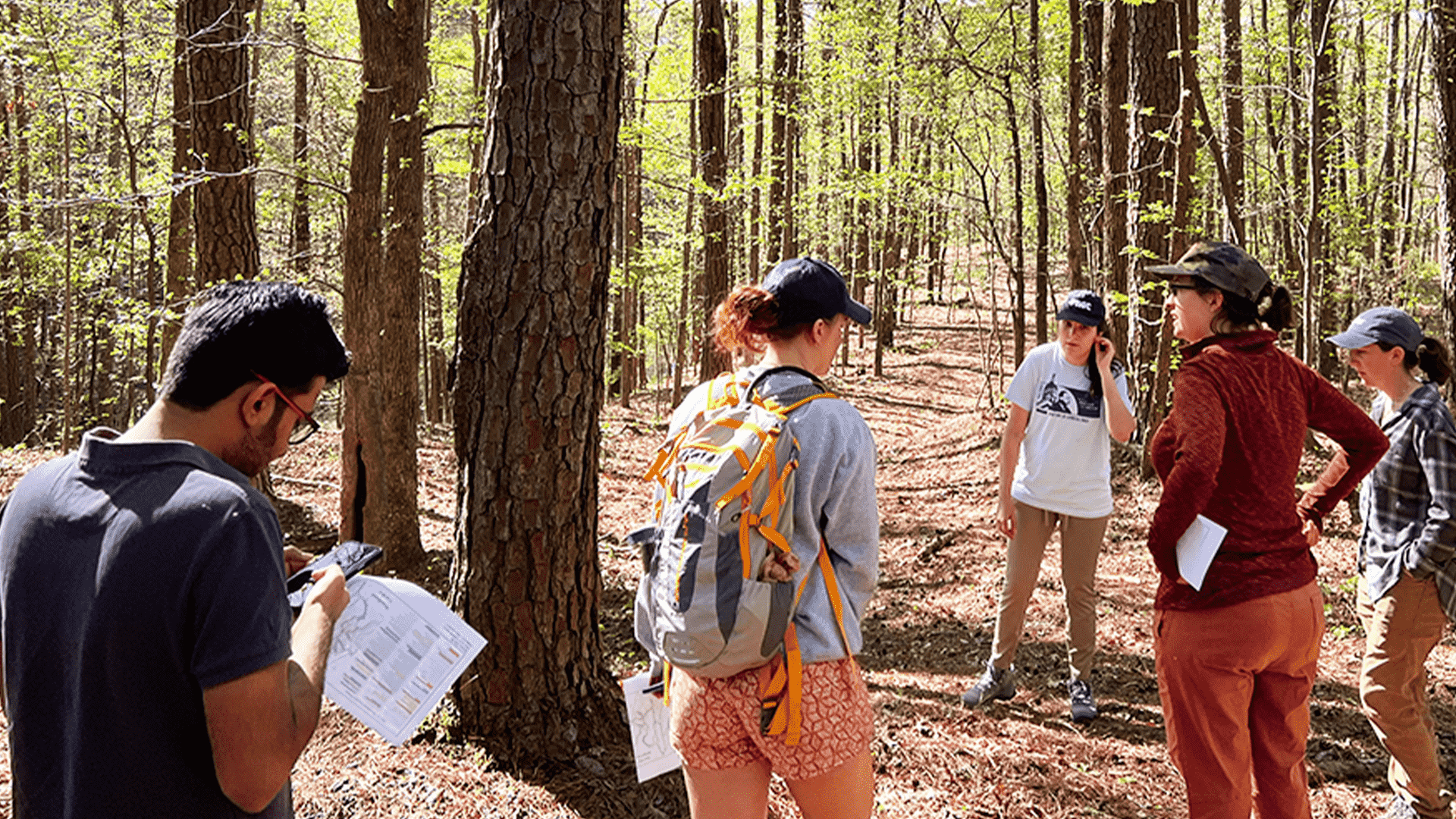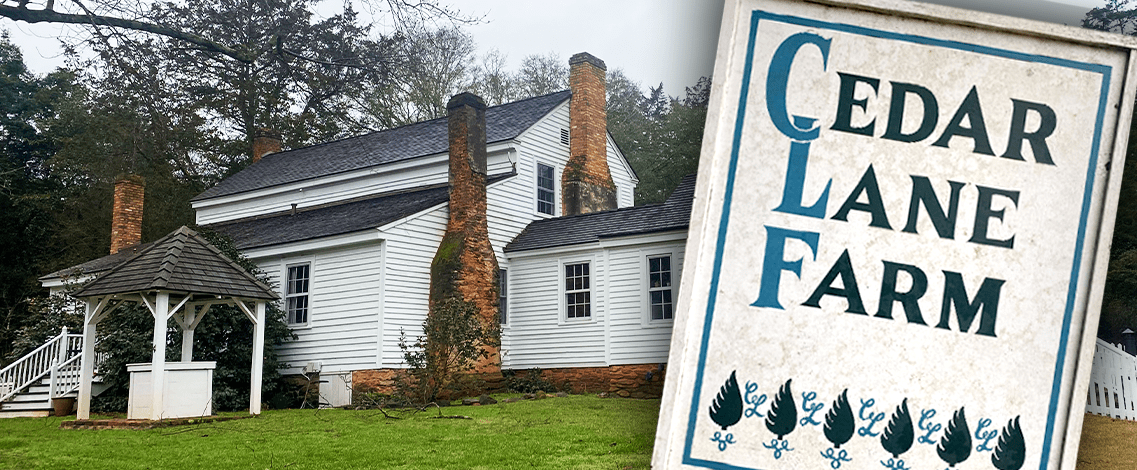
This spring semester, a group of six master’s students from Dr. Eric MacDonald’s landscape management course had the wonderful opportunity to work alongside the owners of Cedar Lane Farm, a historic designed landscape in Morgan County, Georgia. This collaboration allowed the students in Dr. MacDonald’s class to delve into the steps and process of creating a professional management report for a client. Under the guidance of Dr. MacDonald, the students embarked on a semester-long project to develop a management plan for Cedar Lane Farm. This marked the second year of collaboration between the college and the farm owners. In the past, teams have focused on development scenarios such as regenerative farming, creating a management plan for the woodland garden, and a plant guide. The project aimed to provide students with hands-on experience, allowing them to apply their knowledge and expertise to engage with real stakeholders and the landscape outside a traditional classroom.
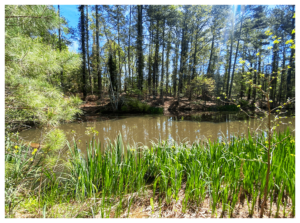
Situated just six miles outside Madison, Georgia, Cedar Lane Farm is a historic farmstay on over 300 acres of pasture and forested land. Sitting on the property is a nineteenth-century plantation plain homestead listed in the National Register of Historic Places that now serves as lodging for visitors. The farm once served as a horticulture nursery owned and operated by the late John and Jane Symmes, both were early proponents of native plant cultivation in Georgia. This farmstead deeply connects to the state’s botanical heritage, with a plethora of historical and cultivated plants and formal gardens curated by Jane Symmes. The intricate trail system, serene ponds, and unique features within the landscape indicate the heritage and history of the nursery industry that once was there. Today, the property is owned by Anne Symmes and her husband, Stephen Ives, who have shared the unique character and charm of the farm by transitioning the homestead into a farmstay, a form of agrotourism providing educational and recreational activities to guests staying on a working farm.
Morgan County, Georgia, requires all farmstay to have at least five educational activities focusing on agriculture. To accomplish this goal, the Symmes family has partnered with courses like Dr. MacDonald’s to come up with opportunities for the farm. Anne Symmes and Stephen Ives hope that previous and current management projects will provide insight into the farm’s future. A common challenge in landscape management is the labor, time, and resources required to manage plant species, a large property, or change the site’s direction. While ground stewards are present at Cedar Lane Farm, the size and amount of plant material labor and resources were challenges presented to the team. Finding management solutions that were not only in line with the future of the property and the current labor force was essential. The Symmes family hopes to continue to share the unique character that Cedar Lane Farm offers with the public through educational activities, regenerative community farming, and the farmstay.
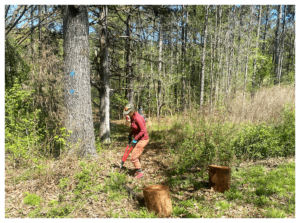
Through their dedication and expertise, the students developed a comprehensive landscape management plan highlighting the property’s rich heritage and promoting agricultural education and sustainable management practices. Students began their journey by immersing themselves in the property’s rich history and cultural significance.Enjoying the opportunity to get outside and experience the landscape for what it is, the team walked the property, surveyed the existing plant material, and documented important details that contributed to the character of Cedar Lane Farm. Olivia Rothstein, a student in the Master of Landscape Architecture program, shared, “It was really refreshing to get out of the classroom and make connections with other people and landscapes.” Through diligent site exploration, initial stakeholder meetings, hands-on fieldwork, and extensive research, the team developed comprehensive management goals.
This semester’s project objectives focused on enhancing connectivity throughout the property, programming existing trail systems for agricultural education, and effectively managing invasive species that threatened the natural ecosystem. With the goals established, the team reconvened with stakeholders to update and receive feedback on their projects.
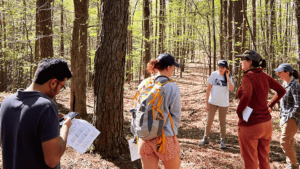 At each phase of the project, the students updated the property owners and managers to ensure the management goals aligned with the future direction of Cedar Lane Farm.
At each phase of the project, the students updated the property owners and managers to ensure the management goals aligned with the future direction of Cedar Lane Farm.
The final landscape management report for Cedar Lane Farm represented a culmination of the student’s efforts. It addressed the
sustainable removal of invasive species, such as Nandina (Nandina domestia) and Mahonia (Mahonia aquilfolium), offering natural removal methods alternative to herbicides. In addition to creating a master trail map, an education-programmed trail map highlighting the property’s agricultural features and recommendations for future trail development. The management document celebrated the farm’s unique history and provided educational opportunities for visitors, fostering a deeper appreciation for agriculture and sustainable practices.

